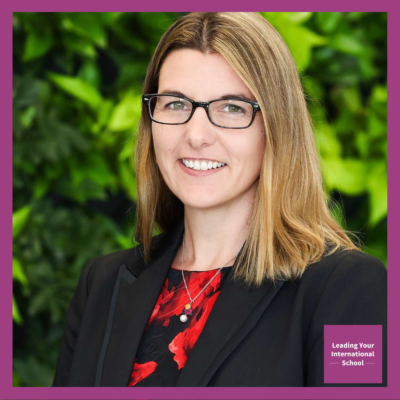by Shelley Swift
“Connection is why we’re here. It’s what gives purpose and meaning to our lives.”— Brené Brown
I’ve always found it surprising that in a sector built on nurturing human potential, so much of our leadership language was borrowed from the world of business – focusing on productivity, top-down control, and metrics. Yet we are not programming machines or selling products. As educators, we are driven by something deeper: a moral purpose, a belief in every child’s potential, and a commitment to social responsibility.
As school leaders, our most important work is relational. It’s about harnessing the best in every student and every staff member, empowering them to be their best selves. Truly flourishing schools provide more than systems alone; they are carefully crafted with people and teams at their heart.
The Science of Belonging
We all have a fundamental need to belong, to feel seen, heard and valued. When we do, we become more motivated, more creative, better learners, and more resilient in the face of stress.
Neuroscientists such as David Rock give us a window into why this is. His SCARF model shows how our brains are wired to respond to social threats and rewards. Things like a perceived loss of status, autonomy, or fairness can trigger a primal ‘threat’ response, shutting down learning and collaboration. Conversely, practices that promote psychological safety – a term powerfully advanced by Amy Edmondson – activate the brain’s ‘reward’ pathways.
Not too long ago, I was fortunate to attend a workshop with Peter Senge and Mette Boell on Compassionate Systems Leadership held in Hong Kong. It was a powerful reminder that combining systemic thinking with the neuroscience of compassion isn’t a soft skill; it’s a strategic one. It’s the magic formula for helping teams learn, adapt, and achieve together.
Small Shifts, Big Impact
The good news is that we don’t need a grand strategic plan to start. Often, compassionate leadership is found in the small, daily interactions. As David Cooperrider’s Appreciative Inquiry teaches us, the words we choose shape our reality.
Here are a few small, humble practices I am mindfully embracing:
Strength-Based Language: fMRI studies show that criticism triggers a fight-or-flight response. Instead of “Why didn’t you do x in your lesson?” (deficit model – what went wrong?), we can ask, “What worked well that we can build on?” (strength-based model – what went well?) This simple shift engages the prefrontal cortex – the part of the brain optimised for learning.
Building Relational Capital: Sometimes, the most powerful thing we can do is resist the urge to fix. Noticing a small issue, like a student still in their PE kit, but choosing to ask, “How’s your week going?” instead, builds trust more than any immediate correction ever could.
Thoughtful Recognition: A little private note saying, “I noticed you check in with Sarah, it really helped her,” makes a person feel uniquely valued. Saving public praise for collective effort – “Thank you to everyone for making this event a success” – reinforces teamwork and reduces competitive threat.
Fearless Feedback: Create a culture where we can all be learners. It means listening without interruption, responding to mistakes with curiosity, and accepting feedback with grace. A simple, “I’d like to understand your perspective more,” can preserve trust and open up a real dialogue.
Knowing Our People: In our beautifully diverse international schools, it’s easy to lean on cultural generalisations. But true belonging comes from seeing individuals. Taking time to learn about a colleague’s background, their journey, and their hidden talents is a far more meaningful strategy than any label. It tells them, “I see you, and you matter here.”
A Final Thought
At its core, effective leadership may be the simple act of being a good human being. It is having the courage to show our own vulnerabilities and the wisdom to create an environment where everyone else feels safe to do the same. When we make the conscious choice to see and value the unique worth in every individual, we lay the foundation for not only high performance but for happier, healthier school communities where all can flourish.
My Challenge to Myself
So here’s my small challenge to myself this week: Discover a hidden talent of one of our quietest teachers.Share a mistake I made with my team, to model that it’s safe to be imperfect.In my next meeting, listen more than I speak.I’d love to hear what works for you. Do share in the comments.
Shelley Swift, Western Co-Principal, Yew Chung International School of Beijing (YCIS Beijing)
LYIS is proud to partner with WildChina Education

———-
🚀 Planning for the next edition of Leading Your International School (LYIS) digital magazine is underway!
We’re already hearing some inspiring stories, and I’d love to feature more. If you have a story to tell or know someone whose journey deserves to be shared, please get in touch. I’d be delighted to have a conversation.
🙏 A big thank you to all our contributors. Each of you has played a huge part in shaping LYIS into what it is today. If you’d like to explore our previous edition, you can find it here.
👏 A special thank you to Anna Broster, who has brought wisdom and vision as Editor across three editions of LYIS. It has been a privilege to work alongside her, and we wish her every success as she develops her new venture, ABC Anglo Basque Connexion.
💡 Do you have a story for our next issue? We’d love to hear from you!
https://lnkd.in/dZ6fsSJ5

